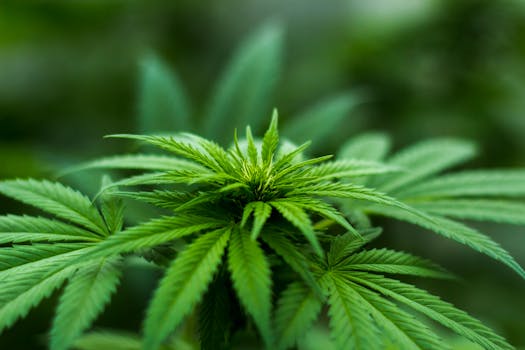Contact Us 720-964-1335 or 901-675-6125
Can CBD & THC Be Consumed with GLP-1 Weight Loss Medications

For many women over 40, GLP-1 weight loss medications like semaglutide (Ozempic®, Wegovy®) or tirzepatide (Mounjaro®, Zepbound®) have been game-changers. At the same time, CBD (cannabidiol) and THC (tetrahydrocannabinol) products are becoming more common for stress relief, sleep, or pain management. But what happens when these two worlds overlap? Can CBD or THC use affect your results (or even your safety) when you’re taking a GLP-1 weight loss medication? This is a conversation worth having, because while CBD and THC are natural plant-based compounds, “natural” doesn’t always mean risk-free, especially when combined with powerful prescription medications.
Understanding GLP-1 Weight Loss Medications
GLP-1 receptor agonists work by slowing down gastric emptying, reducing appetite, and improving blood sugar control. Many women notice less interest in snacking, smaller portion sizes, and more stable energy. This mechanism is key to why they’re so effective for sustainable weight loss, especially during midlife when hormones, stress, and metabolism can make progress feel harder. But because these medications affect digestion and blood sugar, adding anything else into the mix, like cannabinoids, needs a thoughtful approach.
CBD & THC Basics
CBD (Cannabidiol):
- Non-psychoactive
- May reduce anxiety, support sleep, lower inflammation, and provide pain relief
- Found in oils, gummies, tinctures, creams, and capsules
THC (Tetrahydrocannabinol):
- Psychoactive (“the high”)
- Can stimulate appetite (the “munchies”), alter mood, and affect motivation
- Often consumed via edibles, vaping, or smoking
Many women use CBD for stress, arthritis, or menopausal sleep issues, while others may use THC recreationally or medicinally. Both compounds are metabolized by the liver, which is also where GLP-1 weight loss medications are processed.
Where Things Get Tricky: Possible Interactions
1. Digestive System Overlap
GLP-1 weight loss medications (GLP1s) slow gastric emptying, which helps reduce appetite. THC can also slow digestion. Combined, this may lead to increased nausea, bloating, constipation, or stomach discomfort, symptoms that are already common side effects of GLP-1s.
2. Appetite Regulation
GLP-1s are designed to quiet hunger signals, while THC can do the opposite by stimulating appetite. This push-pull may interfere with weight loss goals, especially if THC use triggers late-night snacking or high-calorie cravings.
3. Blood Sugar Effects
CBD may help lower blood sugar and improve insulin sensitivity. GLP-1s already do this, so combining the two could theoretically cause blood sugar to dip too low in some individuals.
4. Liver Metabolism
Both cannabinoids and GLP-1s are processed by the liver. While research is still emerging, combining them could increase strain on the liver or alter how medications are metabolized. This is especially important for women with pre-existing liver conditions.
Practical Tips if You’re Using CBD, THC, and GLP-1s
- Talk to your healthcare provider: Always let your prescribing clinician know about your CBD or THC use. Transparency is key to safety.
- Start low, go slow: If you use CBD or THC, begin with the lowest effective dose and monitor your body’s response.
- Choose wisely: Avoid THC edibles loaded with sugar, which can stall weight loss. Look for CBD products that are third-party tested.
- Track symptoms: Pay attention to nausea, changes in appetite, or unexpected fatigue. Keep a journal to see how your body responds.
- Clarify your purpose: If CBD helps you sleep or eases chronic pain, it may support your journey. If THC use leads to frequent snacking or reduced motivation, it may work against your goals.
Holistic Alternatives for Stress & Sleep
If you’re exploring CBD or THC mainly for stress or sleep, consider layering in other holistic tools as well:
- Breathwork or meditation to calm the nervous system
- Magnesium glycinate to support relaxation and sleep quality
- Herbal teas such as chamomile or valerian root
- Anti-inflammatory foods like fatty fish, leafy greens, and turmeric
- Consistent movement to regulate mood and metabolism
These strategies can be combined with or used instead of CBD/THC, depending on your needs and goals.
The Bottom Line
CBD and THC have potential benefits, but when you’re on a GLP-1 weight loss medication, the interaction is not always straightforward. Some women may find CBD supports their stress management and sleep, indirectly helping their weight loss efforts. Others may struggle if THC use sparks cravings or worsens digestive side effects.
The key is to make intentional, informed choices. Always discuss your supplement or cannabis use with your provider, track your body’s response, and keep your long-term goals in mind.
At Ample Health & Wellness, I specialize in helping women over 40 navigate these real-life decisions with confidence—on or off medication. My FRESH Start Holistic Weight Loss Program and my book The Weight Is Over are designed to give you the tools, clarity, and support you need to succeed for the long haul.
👉🏾 Learn more at amplehealthandwellness.com

References
- Pamplona, F. A., da Silva, L. R., & Coan, A. C. (2018). Potential clinical benefits of CBD-rich cannabis extracts. Neurotherapeutics, 15(4), 825–839.
- Vemuri, V. K., & Makriyannis, A. (2015). Medicinal chemistry of cannabinoids. Clinical Pharmacology & Therapeutics, 97(6), 553–558.
- Nauck, M. A., & Meier, J. J. (2019). Management of endocrine disease: Glucagon-like peptide 1 receptor agonists and cardiovascular outcome trials—an update. European Journal of Endocrinology, 181(4), R211–R222.
